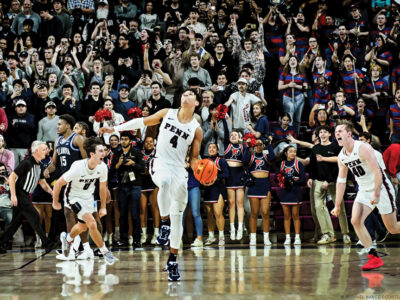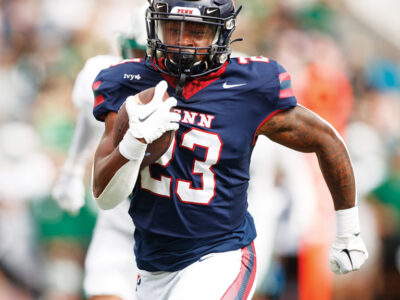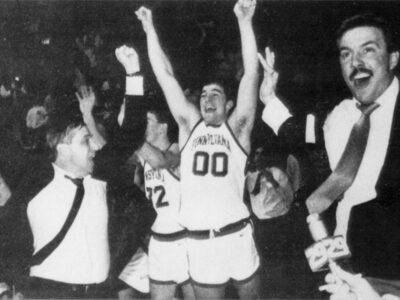By David Porter | About all one would need to know about Penn’s undefeated Ivy League championship football season was encapsulated during a two-minute stretch on November 13 at Franklin Field against Harvard. It was a snapshot in time, but it crystallized the spirit of a Quaker team that stood united in the face of personal tragedy and all but made a mockery of a league that was by any measure strong and balanced in 2010.
Running back Jeff Jack had just taken a short pass from quarterback and fellow sophomore Billy Ragone, and angled 25 yards through the Harvard defense to make the score 17-0. It was a play so well conceived and executed that Jack must have wondered why no Crimson defenders were close enough to put so much as a hand on him. While the scribes in the press box were still jotting down the particulars of the play, a collective shudder went through the 12,500 fans in attendance. Senior Andrew Samson’s kickoff had landed in the arms of a Harvard returner and within about three seconds he had been planted in the turf by a bone-rattling hit … meted out by none other than Jeff Jack.
Jack and fellow running back Brandon Colavita—another sophomore—had spent most of the 2009 season playing on punt and kickoff return teams while a talented group of backs led by then-freshman Lyle Marsh, junior Michael DiMaggio, junior Bradford Blackman, and sophomore Matt Hamscher grabbed the headlines. Then, injuries and personnel moves eventually put them in the starting backfield in 2010, and they wound up combining for nearly 1,200 yards and 14 touchdowns, 12 by Colavita. But their newfound starring roles didn’t blunt their desire for the controlled chaos that is the life of the special-teams player.
“They refused to come off special teams,” coach Al Bagnoli marveled. “That’s just the kind of players they are.”
Other players who fit the same mold: Blackman and Hamscher, who switched from featured ball carriers to the defensive backfield and helped Penn hold opponents to two or fewer touchdowns in six of the final seven games; and Ragone, the lefty quarterback with the nimble feet who went from sometime starter in 2009, to stopgap starter while senior Keiffer Garton recovered from injury in 2010, to an offensive weapon who became a finalist for the league’s player of the year award. Playing in the same spirit was the entire defensive unit, which had been deemed not as imposing as recent Penn squads but managed to overcome the death of its captain and use it as inspiration to reach higher.
Owen Thomas W’11 will always be a part of the 2010 championship team even though he didn’t play a down. His suicide in the spring cast a shadow over the program that grew longer after longtime coach Dan “Lake” Staffieri passed away a few weeks later [“The Mascot in an Old Man’s Suit,” July|Aug 2010]. As the season approached, the players and Bagnoli made a conscious decision not to hide from or downplay Thomas’ death, yet they also refused to allow their sadness to become self-defeating. It was a balancing act that few teams have to manage, and the Quakers did so with taste and eloquence, bringing Thomas’ jersey out to each game to hang behind the defensive bench.
“Owen’s been in everyone’s thoughts, every day, every minute, every second the whole year,” junior linebacker Erik Rask said after the title-clinching Harvard game. “Today kind of culminated everything. This was kind of what we set out to do; we just really wanted to do it for Owen. It’s just an awesome feeling winning it for him because he was such an awesome person and meant so much to so many guys on this team.”
Defining moments in a season don’t usually happen during the first game, but Bagnoli pointed to the opener against Lafayette at Franklin Field as the moment when his players turned an invisible corner and began to put the offseason’s travails behind them. Trailing 14-3 at halftime in a game they’d dominated statistically, the Quakers scored 16 unanswered points and set a tone that would last until Ithaca on November 20.
“I thought that second half, where we were able to put things together, gave us a great impetus for the season,” Bagnoli said.
A frustrating loss to then-No. 1-ranked Villanova followed, after which Penn’s only truly close game was a 35-28 home win over an improved Dartmouth team on October 2. Yale had to score 10 points in the final few minutes to come within a touchdown of the Quakers on October 23, and the Harvard game, perennially a war with championship hopes at stake for one or both teams, was barely a contest beyond halftime.
The season was momentous for Bagnoli as well. He surpassed George Woodruff’s school record for wins, and now owns the best winning percentage (.729) of any Ivy League coach in history. He is three wins from winning his 100th Ivy game. His eight titles are two behind Yale’s Carm Cozza for the best in league history.
“I tell people that all the championships are special, but this one probably more so with all the things that happened,” he said. “A lot of it was going to be determined by how well we were going to react to a tremendous loss … To our kids’ credit, they did a really good job of honoring Owen.”
It took all of five minutes of Penn’s first basketball game to put the demons of 2009-2010 to rest. That was the time it took for junior point guard Zack Rosen to pick up two quick fouls and freshman Miles Cartwright to step in and give the Quakers a needed jolt to purge the bitter taste of last season’s 6-22 record.
Cartwright scored 18 points and Rosen returned to score 16 in the second half to lead Penn past a Davidson team that had walloped them a year earlier by 29.
“We haven’t played since March, and I’ve had 6-22 sitting on my mind since then,” senior forward Jack Eggleston said afterward. “Every time somebody says, ‘Oh, you play basketball? How did you do last year?’ I’d say, ‘Well, we were 6-22.’ There’s not a day or two that goes by without that being in the forefront of my mind. I was very hungry to get out there.”
Inconsistency marked the first quarter of the season, but the bottom line was solidly encouraging: Four wins in seven games, or more wins than the Quakers managed until the middle of February last season.
The good vibes after the opening win over Davidson evaporated the following week in a 59-54 loss to Manhattan in which the Quakers allowed the final 17 points of the game and seemed curiously passive on the offensive end, settling for 3-pointer after 3-pointer after controlling the action to build a 12-point, second-half lead.
A clunker against Drexel and an expected loss to Pittsburgh were balanced by wins against Lafayette and UMBC. A 68-52 win over Army at the Izod Center on December 4 offered a by-the-numbers illustration of the small things the Quakers used to routinely employ to win games: Helping each other on defense, closing off passing lanes, defensive rebounding, opportunistic 3-point shooting. The latter was demonstrated by senior Tyler Bernardini, who has missed so much time the last few years with injuries that he may have been difficult for some fans to recognize when he took the court against Davidson. Bernardini’s shot was missing in action through the first six games, but against Army he nailed three from behind the arc in the second half as the Quakers pulled away late.
“It’s always good to get off to a good start, especially when you’re telling young men there’s a light at the end of the tunnel and if they buy into the process they’ll get rewarded for their hard work,” head coach Jerome Allen W’09 said. “You get the opportunity to get off to a good start, it’s encouraging and I hope it makes them even hungrier.”
Dave Porter C’82 writes for the Associated Press.




